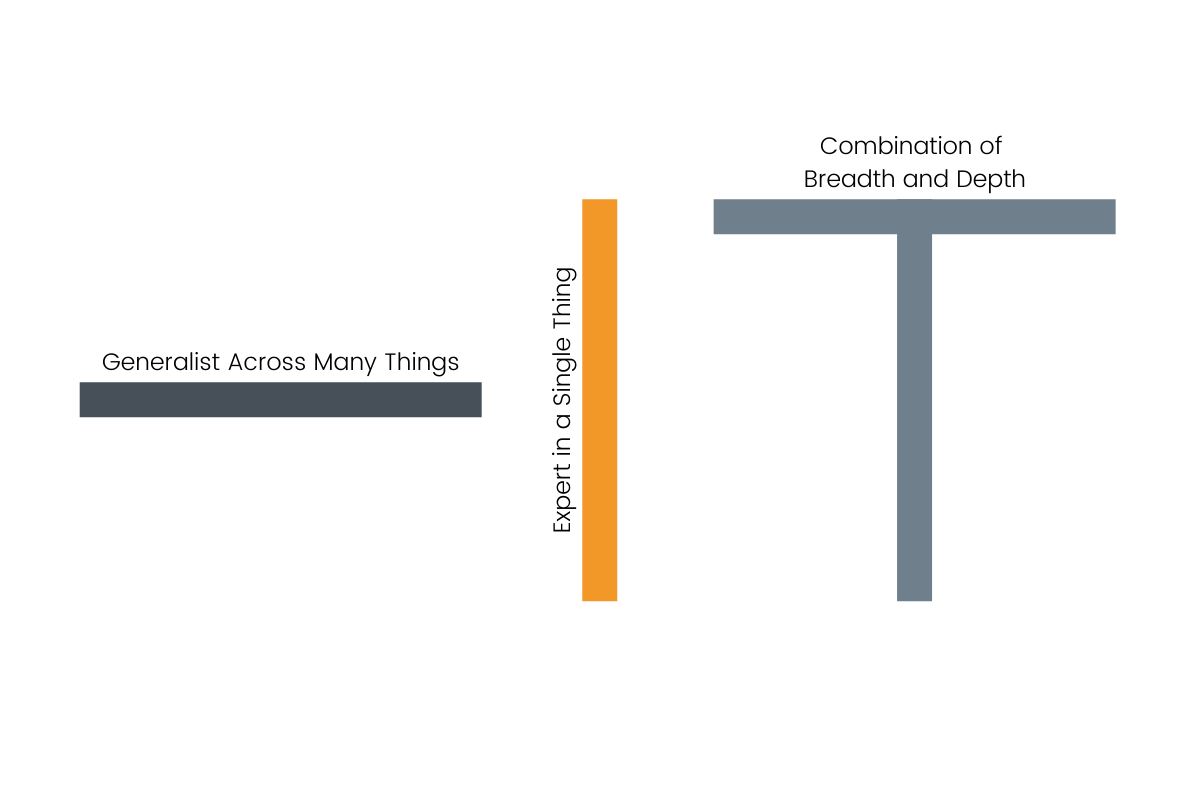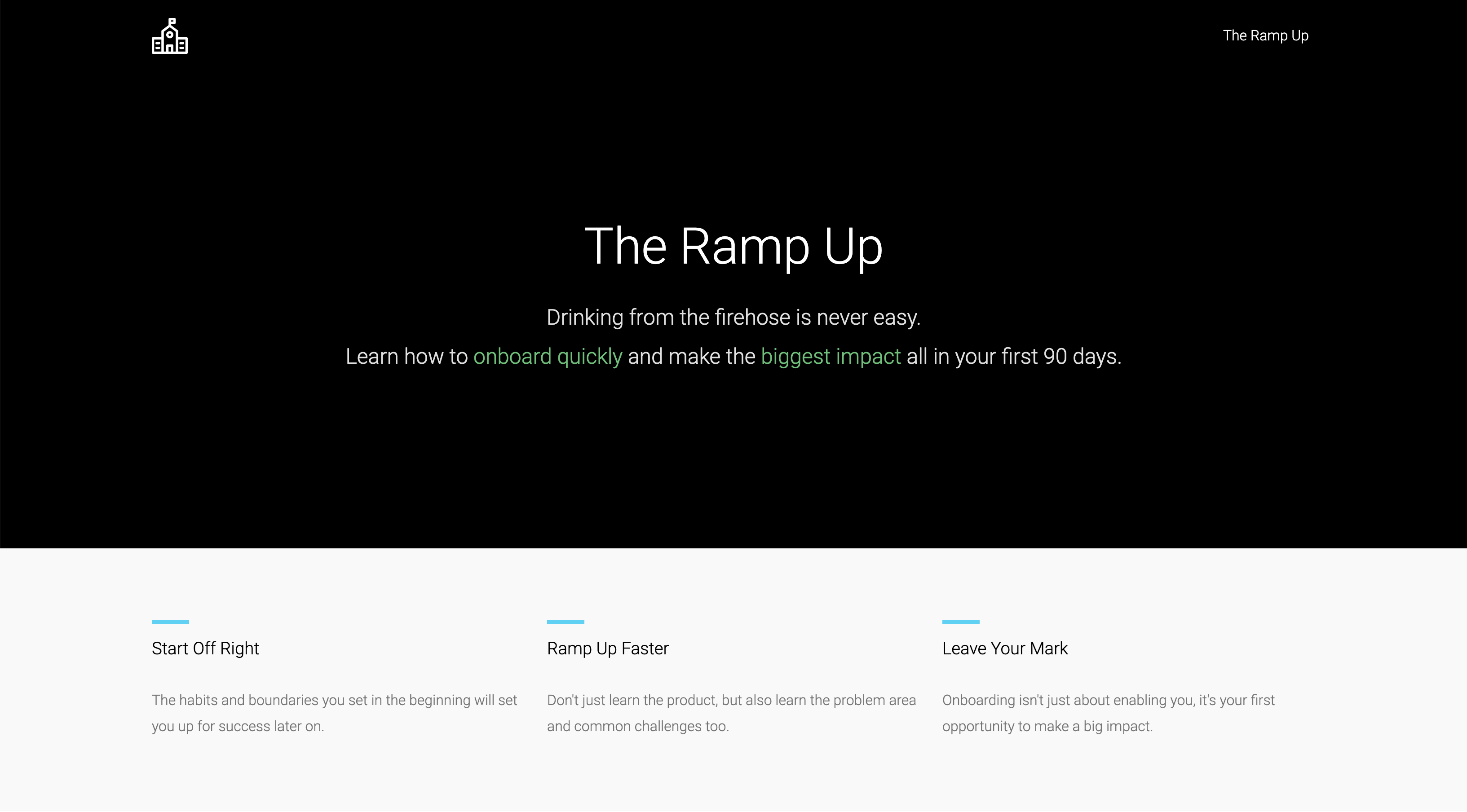The T-Shaped Sales Engineer
Do more with less. That seems to be the motto for every organization, even before covid wreaked havoc on the workplace (physically and financially). But investing in the right people can make all the difference when it comes to doing more with less. Enter the T-shaped individual; a hard find when hiring, but critical to the success of a growing organization.
What is a T-Shaped Person?
No this isn’t a made up term, it is a real thing. In fact, you might have even run into this concept before when choosing your career path as a generalist vs a specialist. The T-shaped individual takes the conversation one step further by combining two main characteristics; the vertical stroke of the “T” representing depth of skill, and the horizontal stroke of the “T” representing breadth of skills. The greater the ability to collaborate across disciplines, the larger the impact an individual can have within an organization.

For this to really make sense though, let’s look at three different types of individuals; the generalist, the I-shaped individual, and the T-shaped individual.
The Generalist
If you are just starting out in your career or have avoided niching down, you are considered a generalist. You most likely know a little bit about a lot of different domains within cybersecurity. As you progress in your career and work for different companies, you’ll tend to find areas that interest you more than others (naturally). Being a generalist can also go beyond technical skills and include softer skills such as communication and writing, however your ability to use these skills will still be superficial at best.
The I-Shaped Individual
The I-shaped individual is really just another name for a specialist. This is usually someone with deep technical expertise and domain knowledge in a specific area. For example, let’s say you niche down and become a penetration tester. You might have deep knowledge in how to break into systems, social engineering, and using code to automate attacks. On the flip side you probably wouldn’t be an expert in compliance or cloud security.
The T-Shaped Individual
We’ve covered those with broad skills (generalist) and those with specific expertise (I-shaped). Now let’s combine them to talk about the T-shaped individual, someone that combines both breadth of knowledge and depth in key areas. They are often well versed in multiple disciplines and experts in a handful of areas. To use the cliche, they have “the best of both worlds” by being able to go deep and wide.
While some people really enjoy being generalists, or experts in a specific area, know that to be successful in a pre-sales role you will need to use more than just technical aptitude. By growing your soft skills or skills in adjoining disciplines (like marketing or customer success), you are naturally transforming yourself to be more T-shaped without even realizing it.
Benefits of Being a T-Shaped Sales Engineer
Whether you want to be a senior level individual contributor or lead a team of people, being T-shaped will help to unlock several doors for you. As you gain experience in pre-sales you will begin to build empathy for those you interact with (internally and externally). This will give you a greater appreciation for their pain points while allowing you to deliver more value to them.
Strategic Advisor vs Technical Expert
Have you ever worked with a customer trying to make inroads towards the executive team only to be sidelined because they view you as the “technical expert”? T-shaped individuals are well positioned to overcome this objection because they have the ability to draw from both several areas of technical expertise as well as experience from working with various stakeholders on the customer side. Perhaps you are building an ROI model for an executive or working with the risk team on a compliance requirement.
The ability to have these different conversations while providing guidance can help differentiate you to your customers because you have broken free from the “technical expert” box they put you in. This not only helps to establish trust, but it makes you a valuable internal resource as well.
Driving More Value
The role of the Sales Engineer often goes beyond just supporting sales to include support for internal teams, like Marketing or Product. Knowing how to support others in these adjoining roles is critical to being successful both in your individual role and as part of a larger team within an organization.
As the person constantly talking to customers, you are privy to conversations, data, and feedback that can help shape everything from messaging to events to new product features. If you can learn to think like a marketer or a product person, you have a greater chance of providing support and feedback to those teams in a way that makes it easier for them to understand (which in turn drives up your value internally).
Tip: If you are in a pre-sales leadership position, investing in T-shaped individuals helps to strengthen collaboration and communication among both existing team members and between internal teams. Breaking down those silos can help with increasing employee agility and improves the organization’s overall efficiency.
The Hunt for T-Shaped Individuals When Hiring
Unsurprisingly, pre-sales, and cybersecurity pre-sales more specifically, continues to be a hot job market with some fierce competition for roles. When hiring for pre-sales positions, make sure you consider what type of person you are looking to hire (beyond just technical expertise). Do you need someone with deep technical expertise (I-shaped) or someone that is well rounded who can adapt to multiple roles as needed (T-shaped)?
Here are some key tips for finding the right choice.
Resumes are Only Part of the Equation
The first item that you often see when considering someone for a position, the resume tends to paint a very specific picture of an individual. However, what do you know about the person if you look beyond their resume? Are they active on social media? Do they have any side projects?
Many people don’t keep their resume updated because they only need them when they are looking for a new job. When they do update them, there is a chance that they forget to include information. Yes, the burden is on job seekers to put their best foot forward, but you also don’t want to miss out on really good talent because of an oversight on their resume.
Another common challenge is the initial HR scanning that disqualifies people based on keywords, or lack thereof, in their resume. Because T-shaped individuals have a variety of breadth and depth, they might be filtered out for not including certain skills or keywords in their resumes…even if they might be an awesome fit for the role.
Just don’t forget that resumes are only one part of the equation in the hunt for talent.
What to Include in Job Descriptions
Job descriptions these days are pretty standard when it comes to information. A little about the company, a little about the role, and a little about the technical skills. What’s often omitted though, is the broad context of who you’ll be collaborating with and some of the lateral skills that will be needed to do the role.
You don’t want to just hire someone to “fill a seat”, you want them to be successful. By providing more content and context within the job description itself, it will give applicants a better sense of what’s really needed to get things done and be successful in the role.
Where to Go From Here
Whether you are looking to build up your skills or hire more people for your team, you hopefully see the value in T-shaped individuals. If you are serious about branching out to become more T-shaped, start by talking to other team members in different departments (like Marketing or Product). Get a sense of their daily challenges and translate that back into areas where you can provide help. Always remember that the day you become comfortable in your job is the day you’ll stop growing.
Ready to Make an Impact?
Scout is all about helping people get hired into a pre-sales role, but what happens once you get there? Don't worry, we got you covered there too! Learn how to make the biggest impact within your first 90 days in what we so eloquently call, "The Ramp Up".
